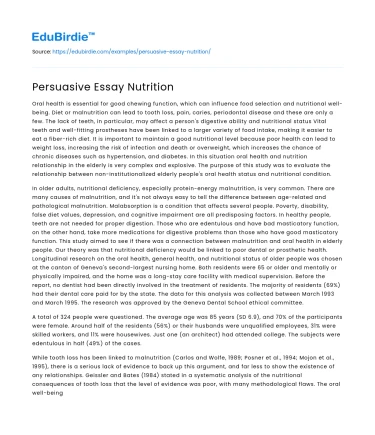Oral health is essential for good chewing function, which can influence food selection and nutritional well-being. Diet or malnutrition can lead to tooth loss, pain, caries, periodontal disease and these are only a few. The lack of teeth, in particular, may affect a person's digestive ability and nutritional status Vital teeth and well-fitting prostheses have been linked to a larger variety of food intake, making it easier to eat a fiber-rich diet. It is important to maintain a good nutritional level because poor health can lead to weight loss, increasing the risk of infection and death or overweight, which increases the chance of chronic diseases such as hypertension, and diabetes. In this situation oral health and nutrition relationship in the elderly is very complex and explosive. The purpose of this study was to evaluate the relationship between non-institutionalized elderly people's oral health status and nutritional condition.
In older adults, nutritional deficiency, especially protein-energy malnutrition, is very common. There are many causes of malnutrition, and it's not always easy to tell the difference between age-related and pathological malnutrition. Malabsorption is a condition that affects several people. Poverty, disability, false diet values, depression, and cognitive impairment are all predisposing factors. In healthy people, teeth are not needed for proper digestion. Those who are edentulous and have bad masticatory function, on the other hand, take more medications for digestive problems than those who have good masticatory function. This study aimed to see if there was a connection between malnutrition and oral health in elderly people. Our theory was that nutritional deficiency would be linked to poor dental or prosthetic health. Longitudinal research on the oral health, general health, and nutritional status of older people was chosen at the canton of Geneva's second-largest nursing home. Both residents were 65 or older and mentally or physically impaired, and the home was a long-stay care facility with medical supervision. Before the report, no dentist had been directly involved in the treatment of residents. The majority of residents (69%) had their dental care paid for by the state. The data for this analysis was collected between March 1993 and March 1995. The research was approved by the Geneva Dental School ethical committee.
Save your time!
We can take care of your essay
- Proper editing and formatting
- Free revision, title page, and bibliography
- Flexible prices and money-back guarantee
A total of 324 people were questioned. The average age was 85 years (SD 6.9), and 70% of the participants were female. Around half of the residents (56%) or their husbands were unqualified employees, 31% were skilled workers, and 11% were housewives. Just one (an architect) had attended college. The subjects were edentulous in half (49%) of the cases.
While tooth loss has been linked to malnutrition (Carlos and Wolfe, 1989; Posner et al., 1994; Mojon et al., 1995), there is a serious lack of evidence to back up this argument, and far less to show the existence of any relationships. Geissler and Bates (1984) stated in a systematic analysis of the nutritional consequences of tooth loss that the level of evidence was poor, with many methodological flaws. The oral well-being report of adults aged 65 and over who took part in the British National Diet and Nutrition Survey (NDNS) used two different demographic groups living in the United Kingdom: one a representative sample of the independently living population aged 65 and over, and the other a representative sample of adults aged 65 and over who lived in institutions (Finch et al., 1998). Medical Research Ethics Committees approved the procedure, and all participants gave their informed consent. Previous research has found that oral health, specifically the number and distribution of natural teeth, has an impact on eating capacity and masticatory effectiveness. There isn't enough information to say how this could affect elderly people's food intake. The consumption of nutrients by older people was linked to their dental health in this research.
Oral health is essential for good chewing work and can influence food selection and digestive well-being. The connection between oral and nutritional health in the elderly is complicated and contentious, and our current understanding is poor. This research aimed to see whether there was a connection between oral health and nutritional status in non-institutionalized elderly people. The elderly patients studied had an average age of 71.75.35 years and were split into two groups: the Young Senior Group (39.4 %) and the Elderly Senior Group (60.6%); 97 % were female and 3% were male. We discovered in this study that changes an individual's nutritional status. According to a review of the literature, patients with significant tooth loss are more likely to reduce their consumption of foods with a thick consistency, which is a good source of vitamins, nutrients, fiber, and protein.
As a result, the importance of nutrition to oral health is quite high. Tooth loss, chewing muscle problems, and periodontal disease may be caused by nutrition. Therefore, old people should pay attention to their nutrition both for their general health and for oral health.






 Stuck on your essay?
Stuck on your essay?

